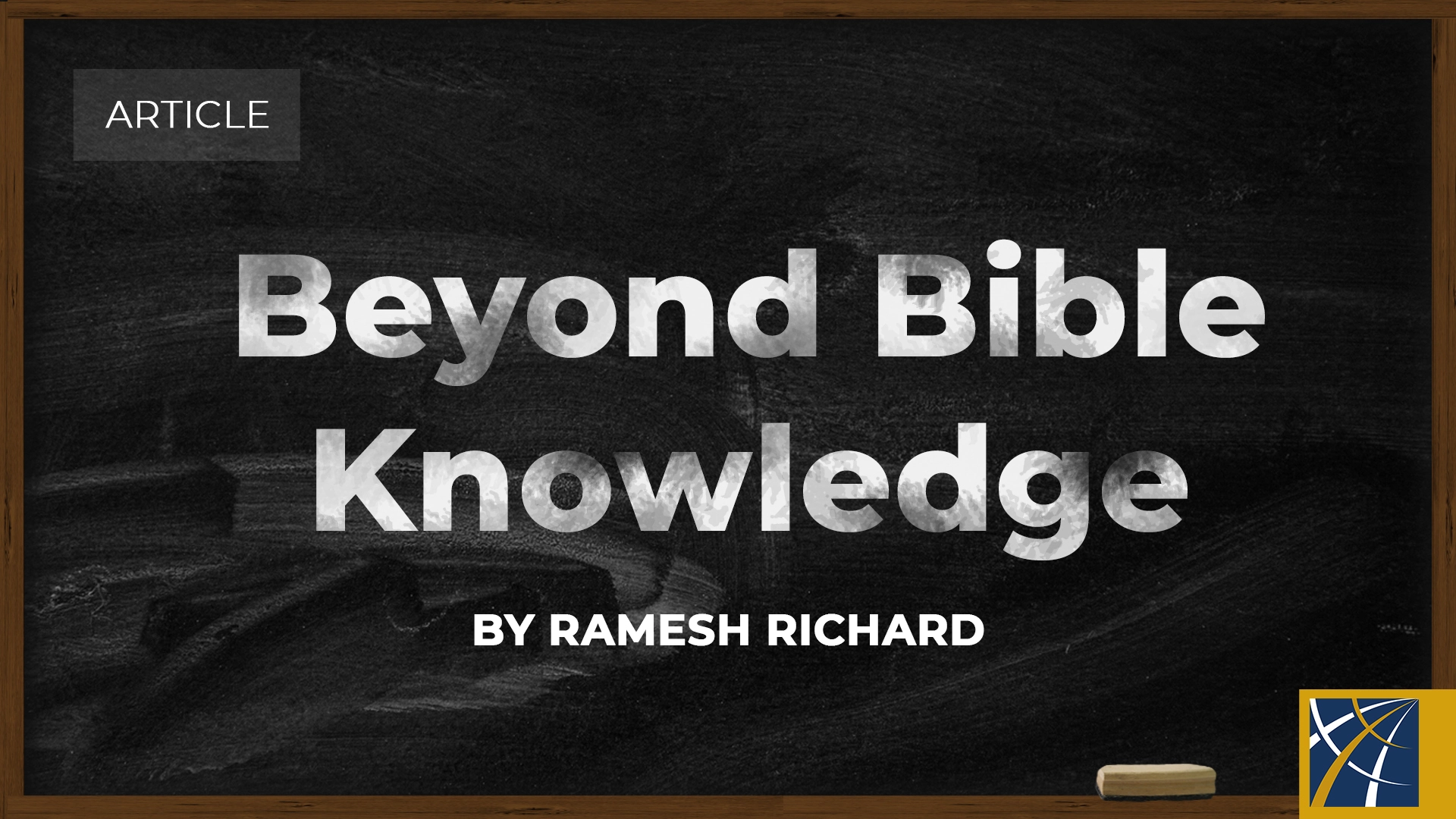by Ramesh Richard
“God”—an overstuffed notion that evokes all kinds of meanings is also an over-used noun. If we played a word-association game, you will fill “God” with all sorts of meanings, some unique to your own life. I saw that generic-God described on a T-shirt: God is like:
Coke—He is the real thing
Pan Am—He makes the going great
General Electric—He lights your path
Bayer Aspirin—He works wonders
Hallmark Cards—He cares enough to send the very best
Tide—He gets the stains out that others leave behind
VO5 Hair Spray—He holds through all kinds of weather
Dial Soap—Aren’t you glad you know him? Don’t you wish everyone did?
Sears—He has everything
Alka Seltzer—Try him, you’ll like him
Scotch tape—You can’t see him, but you know he’s there
From exclamations to expletives, the word “God” stirs up an entire history of personal experience. It is also laden with emotion as you pore over a history of the Crusades, Holocausts, and Jihad. “In God we trust,” “God Bless America,” and “Under God”—these are phrases that discomfit secularists and discomfort non-religious people. Recently there was a protest against the phrase “under God”—added in 1954 to the American Pledge of Allegiance—as a religious reference that doesn’t belong in public pledges. We can excise the “G” word from our vocabulary, but not from our consciences, any more than an orphan can stop believing that he has a mother (Austin Farrar). The notion of an eternal, powerful, monotheistic God is stubbornly suppressed by people, says the Apostle Paul (Romans 1:18-25).
Among those who do believe in a “God,” the question arises as to whether or not they believe in the same God. Bertrand Russell was sent to prison during World War I for opposing the war. The jail warden asked the customary questions to atheist Russell: name, age, place of residence. Then he inquired, “Religious affiliation?” “Agnostic,” Russell replied. The poor man looked up, “How do you spell that?” Russell spelled, “agnostic” for him. The warden wrote the word carefully on the prison admission form, and then sighed, “Oh well! There are a great many sects, but I suppose they all worship the same God” (Leo Rosten).
In the aftermath of New York City’s international tragedy, people were forced to examine and expose their convictions about God. The question that constantly came up was, “Do Jews, Christians, and Muslims worship the same God?”
A Christian deacon prayed, “Lord, Yahweh, Allah, or by whatever name you are called, God” without comment from his pastor. How many other names can the notion of “God” contain? Why didn’t the deacon go on to add Krishna and Buddha to the list? Because he aptly and conveniently separated the Mediterranean or monotheistic faiths from non-Mediterranean religions. Yet, we must tackle whether the three great middle-Eastern, Mediterranean, Semitic, monotheistic religions believe in the same God though they believe in one God?
First, the word “God” is simply a transitive noun (K. Cragg). It is transitive in the sense that only in his relationship to Creation is he God. He is not God in relation to himself. God does not need to refer to himself as God! The little three letter word is more than a notion, it is a proper noun, but is less than a personal noun. For once you introduce a specific name such as Ramesh Richard into the generic noun (male), he becomes distinguishable, identifiable, discernible.
Second, we can’t contend the fact that Jews, Christians and Muslims use the same word for “God.” They share monotheistic convictions—a singular, not plural God. He is the Ultimate Reality, separated, not synonymous with created realities. Or, as the secretary said to her boss, “There is One God, and you ain’t he!” The monotheistic God is not an It (though I have heard an atheist use “She” for “God” throughout a debate) and as such, is personal rather than non-personal. He is the Original Creator of heaven and earth, the Present Sustainer of life, and the Final Judge of all human beings. These shared concepts of God allowed the Arabic Christian Bible to use the word “Allah” for God even before Islam! Scholars notice consonantal connections between the Allah (Al) of Arabic and Elohim (El) of the Hebrew Bibles.
Third, “Jesus” is the point where the shared concept unravels. Depending on perspective, something is integrally lost or gained in the God-notion and the God-noun once you introduce a God-name. As long as Christians don’t introduce the name of Jesus into deity, we could all pray to the same God. If you hold Jesus merely as a prophetic figure, Judaism could and Islam would talk to you. Certainly, Judaism and Islam have problems talking to each other for issues other than Jesus. Judaism does not recognize Muhammad as God’s prophet, and Islam does not recognize Israel’s self-understanding as divinely chosen. Yet it is the Lord Jesus who scrambles the monotheistic connections, confounds the Semitic religions, confuses Mediterranean convictions. Without Jesus as deity, all three monotheisms could refer to the one and the same God. But if the unchangeable, unnameable “God,” names himself YHWH (cf. Exod. 3:14), Muslims have a problem with that self-naming in relation to humans. If the human Jesus claims YHWH as his name, then Jews and Muslim have a problem with Jesus. We really have three religions worshiping different Gods in nature and name, though they share the same notion and noun.
Now, why do Christians embrace Jesus as God? Is it for religious reasons—to make God share his glory with other supposed members of Godhood? Are they disguised polytheists? Is it for anthropological reasons—to make a human being out to be God? Are they covert idolaters? Is it for political reasons— to run crusades, control infidels and keep them in ignorance for the sake of social peace? Are they control freaks?
Not at all. Jesus is the most unlikely candidate that a contemporary Christian would present as deity! He lived 2000 years ago—so he hardly relates to the 21st century. He was born and reared in a remote Middle-Eastern village—so he was hardly aware of globalization. And he was a young, single, male—so he would hardly be relevant to a planet facing an aging Western population with huge marital and family problems along with gender-general lifestyles.
Those charges would be true if it were not true that Jesus is God. For indeed, God could relate to any century, any nation, any person regardless of history, geography or individual circumstance—the monotheistic concept.
The only reason Christians consider Jesus as God is for Jesus’ own reasons! Christians, too, are coping with Jesus’ own understandings as the monotheistic God. They don’t want to make Jesus God if he is not God. But they carefully consider his claims and humbly receive God’s provision for the chronic human situation in Jesus.
If you seek to understand the Lord Jesus Christ as God, you would consider our original question under three further questions:
(1) How does Jesus’ claim to be the monotheistic “God”?
(2) How does Jesus handle monotheism without contradiction, confusion, or conflict while asserting his own deity? *
(3) How are we going to respond to Jesus’ self-understanding as God? *
How does Jesus Claim to be the Monotheistic “God”?
(1) Jesus affirmed the Deuteronomic Shema “The Lord our God is One Lord” (Mark 12:29). In the Mediterranean, Semitic tradition, Jesus was a monotheist!
(2) Jesus said his word was “eternal” like God’s word. Compare Isaiah 40:8 with Matthew 24:35 (cf. Mt. 5:18) and Mark 13:31 to see that Jesus is making an astounding assertion about his own words never passing away. Unless, of course, he was a 1st century version of an, outrageous, shock-value creating, talk-show host!
(3) Jesus was not merely a prophet, as the Jews claim of Moses and Muslims claim of Mohammed. Prophets need divine authority for their sayings with a preliminary, “Thus says the LORD” as the Old Testament and Quran’s view of inspiration testify. Instead, Jesus in his “Amen” sayings not only stands in the prophetic tradition but also claims a divine convention. His sayings do not need outside approval. “Amen, amen; Verily, verily; Truly, truly, I say to you” parallels the LORD of “Thus says the LORD.” He
is his own authority on his word, just like the LORD is authority in speaking his word. In effect, the LORD Jesus, God, is saying it. Unless, of course, he was a first-rank, hare-brained, mad-cap! (4) Jesus did not use the Greek word for God [theos] for himself, simply because he wasn’t speaking Greek to Hebrew and Aramaic speakers. Instead, he would use the Jewish YHWH or Adonai (cf. Mt. 22:43) or an Aramaic equivalent. And that he did in his clear and controversial claim “Before Abraham was, I am!” (John 8:58). In Mark 11:3, he refers to Himself as kurios, a Greek word that translates YHWH nearly 6,000 times in the O.T. LXX. That document was translated two hundred years before Jesus. An amazing self-reference, unless, of course, he was a snake-oil, con-artist, racketeer!
(5) Like God, Jesus forgives sins (Mark 2:1-12). You don’t go about forgiving any and everyone who has not sinned against you, unless you are God against whom is all sin. Now, of course, Jesus could have been a narcissistic, egotistical, psychopath to think all sin is against him as God. But at least, he did really believe he was God.
(6) Jesus asserted authority over God’s temple (Mt. 12:6), over the God-instituted Sabbath (Mt. 12:8), and over Satan’s Kingdom (Mt. 12:24ff; Jn. 12:31) (George Carey). Only God could and should make that assertion, unless, of course, he was a three-ring circus buffoon!
(7) Jesus claimed to be of the same nature—not just in purpose, or will, or desire—but of the same essence of God. We read that claim in the Greek neuter gender used by Jesus in “I and the Father are One” (Jn 10:30) as understood by the response of ardent monotheists. Further, to see him is to see the Father (Jn. 14:9). To know Jesus is to know the Father (8:19; 14:7). He is in the Father and the Father is in Him (Jn. 10:38; 14:10,11). These are true statements unless Jesus was a schizophrenic megalomaniac!
(8) Jesus personally includes and excludes men from the Kingdom of God (Mt. 12:28; Lk. 11:20). He didn’t merely preach or present the criteria for entry into the kingdom of God. How people personally related to him was the criterion of entrance and exclusion (Mt. 7:21; Lk. 12:32; 22:29ff; 23:42). People would be stunned by this declaration, unless they knew him to be a blasphemer, a Satan-inspired miracleworker!
(9) Like the monotheistic God, He will return to personally judge the world (Mark 14:62). “…the Father has entrusted all judgment to the Son, that all may honor the Son just as they honor the Father” (Jn. 5:22,23). What kind of a pronouncement is this, unless, of course, he was a sophomoric idiot who didn’t know he was wrong?
(10) Jesus expected no successors (C. F. D. Moule). He appointed twelve apostles and did not include himself in their number. Why? Because the One God has no predecessors or successors.
________________________________________________________________
For Dr. Ramesh Richard s talk on “Contrasting Religious Belief Systems” feel free to request an audio version by clicking here, and we will send you a link or a CD.
The issue for Christians is clear—the One God includes Jesus Christ, and in the One God there is no nonJesusChrist. If Jesus Christ is God, and there is no God without Jesus Christ, and God includes Jesus Christ, the notion of monotheism and the noun “God” turns into a “name” for Christians. There is no generic God that Christians share with other monotheists. Whenever God is mentioned, Christians can’t even imagine a God outside Jesus Christ, a God who does not include Jesus Christ in his very nature.
“Powder”—that word presently spells anxiety across the land. We never thought we’d be nervous over something so harmless as white powder. Some airlines ceased offering creamers with their coffee. Sales of white-powdered donuts have dropped. White-powder hoaxes and false alarms have increased.
Sadly, “powder,” a noun, could also carry a deadly-name, “anthrax.” Is all powder the same? No. It all depends on its composition, contents and constituents. We will not blindly consider all powder to be the same.
Do we all believe in powder? Yes. Are all powders the same? No! The chemical composition of the powder determines their uses—as a spice, a cosmetic, or as a weapon. Even some effective healing agents like antibiotic drugs are white powder! It’s not the notion or the noun, but the name and the nature of the powder that makes the difference between death and life.
Do Jews, Christians, and Muslims believe that there is One God? Yes—as do some Hindus, animistic religions, and even the demons (James 2:19). Yes, they all believe that there is One God, as they believe there is white powder, because no one can quite get away from believing in One God. There are plenty of pointers to the transcendent, perfect, creator God.
Yet do Jews, Christians and Muslims believe in the same God? No—for Jesus considers himself as fully God and fully man in his earthy life. Jews, Christians, and Muslims believe in one God, but not in the One God. All three believe in one God, but not in the same God. We really do invite all people to believe in the same, One God—the Lord Jesus Christ.
As one who shares the very nature of God, Jesus distinguishes God’s remedial antibiotic from lethal powder. Other solutions to the human dilemma are fatal forever. At this writing, the Federal and Drug Administration has ordered employees at a mail center to undergo a full-scale antibiotic treatment with an approved drug. Similarly the Lord Jesus, whom God has approved (cf. the resurrection shows God’s approval), is also the one He has ordered as the divine solution for humanity’s chronic condition. Anyone, anywhere can receive God’s medication for eternal healing from the deadliest of all infections, human sinfulness—the Lord Jesus Christ.






